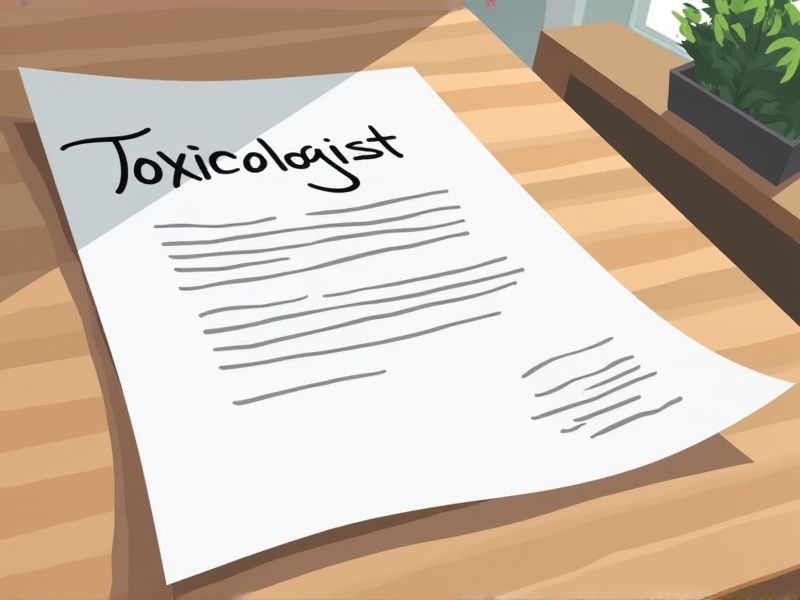
Toxicologists often work with hazardous chemicals and materials, requiring them to understand and manage potential risks effectively. Certifications ensure they are equipped with the necessary skills and knowledge to conduct accurate assessments and comply with regulatory standards. These credentials also demonstrate a commitment to maintaining high professional standards in a field that has direct implications on public health and safety. Consider pursuing these important certifications for a career in toxicology.
American Board of Toxicology (ABT) Certification
Achieving American Board of Toxicology (ABT) certification helps establish a toxicologist's credibility and professional standards in the field. This certification ensures practitioners possess up-to-date knowledge and skills, enhancing the accuracy of toxicological assessments. In a competitive job market, ABT certification can increase career opportunities and potential salary growth. Employers often view certified toxicologists as more reliable and competent, fostering trust in their expertise and decisions.
American Board of Clinical Toxicology (ABCT) Certification
Achieving certification from the American Board of Clinical Toxicology (ABCT) signifies that a toxicologist has demonstrated a comprehensive understanding of toxicological principles and practices. Employers often seek certified professionals as this designation assures a certain level of expertise and commitment to the field. Certification can enhance career opportunities and professional credibility, distinguishing certified individuals from their peers. Furthermore, ABCT certification may be a requirement for certain positions or collaborations within specialized areas of clinical toxicology.
Certified Industrial Hygienist (CIH)
Certified Industrial Hygienists (CIHs) provide crucial expertise in assessing and controlling environmental factors that can affect health, which assists toxicologists in evaluating human exposure to harmful substances. By understanding workplace hazards, a CIH ensures that toxicologists have accurate data on exposure limits and potential risks. Comprehensive risk assessments require collaboration between CIHs and toxicologists to develop effective mitigation strategies for hazardous exposures. CIHs contribute to the implementation of safety protocols, ensuring toxicologists can recommend informed measures to minimize health risks.
Certified Hazardous Materials Manager (CHMM)
A Certified Hazardous Materials Manager (CHMM) is crucial for a toxicologist because it ensures compliance with environmental regulations, reducing legal and financial risks. The CHMM credential validates a thorough understanding of hazardous material handling, which enhances safety in toxicological studies. Possessing this certification provides toxicologists with advanced skills in risk assessment and mitigation, crucial for preventing contamination and exposure. It also facilitates effective communication and collaboration with regulatory agencies, promoting more efficient management of hazardous substances.
Registered Environmental Health Specialist (REHS)
The REHS provides critical knowledge and skills in public health regulations, which ensures toxicologists can effectively assess and mitigate environmental health risks. Expertise in environmental health standards enables toxicologists to identify potential hazards in various settings, facilitating safer public health outcomes. Collaboration between REHS and toxicologists enhances the evaluation of chemical exposures and their impact on human health, leading to more informed policy recommendations. Regulatory insight from an REHS equips toxicologists with a comprehensive understanding of compliance requirements, supporting more thorough risk assessments and interventions.
Certified Environmental Professional (CEP)
A Certified Environmental Professional (CEP) provides essential credibility and enhances trust in a toxicologist's expertise, aligning with industry standards and regulatory requirements. This certification ensures the toxicologist possesses an advanced understanding of environmental laws and policies crucial for accurate hazard assessments. The CEP credential emphasizes a commitment to ethical practices, which is critical in managing environmentally sensitive projects. Hiring a CEP-certified toxicologist can significantly improve an organization's compliance with environmental regulations, thereby reducing legal risks.
OSHA HAZWOPER Certification
OSHA HAZWOPER Certification ensures that toxicologists are trained to safely handle hazardous substances. The certification reduces the risk of exposure-related incidents by instilling necessary safety protocols. Beyond personal safety, it promotes compliance with federal regulations, mitigating potential legal consequences. Proper training leads to enhanced readiness in emergency response situations, benefiting both the individual and the broader community.
Certified Safety Professional (CSP)
The Certified Safety Professional (CSP) credential provides toxicologists with a formal recognition of their expertise in safety management and risk assessment. When addressing hazardous chemicals and potential exposure risks, a CSP certification ensures that toxicologists maintain up-to-date knowledge and skills in safety protocols. The presence of a CSP credential can enhance a toxicologist's credibility when implementing workplace safety measures, influencing organizational policies. For industries dealing with chemical hazards, having a toxicologist with CSP certification ensures a higher standard of safety leadership and can lead to reduced incidents and liability concerns.
Board Certification in Poison Control
Board Certification in Poison Control ensures that toxicologists possess a validated level of competence and expertise. This certification standardizes knowledge across professionals, leading to more consistent and reliable patient care. It enables toxicologists to stay updated with evolving toxicological practices and emerging chemical threats. Certified professionals often earn greater trust and recognition, facilitating better collaboration with healthcare teams and public health agencies.
Certified Risk Assessor Certification
Possessing a Certified Risk Assessor Certification equips toxicologists with the essential skills to evaluate potential hazards effectively. This certification ensures they adhere to industry standards when assessing the risk levels of chemicals and compounds. With the certification, toxicologists gain credibility and recognition, boosting trust among clients and stakeholders. Lack of certification might limit a toxicologist's ability to contribute to comprehensive risk management strategies.
Summary
By obtaining certifications, you as a toxicologist can enhance your professional credibility and increase your job opportunities. Certification often results in improved knowledge and skills, leading to better decision-making in critical situations. As a direct effect, employers are more likely to trust your expertise, potentially leading to career advancement and higher salary prospects. Clients and colleagues may also perceive your assessments as more reliable and authoritative, solidifying your reputation in the field.
